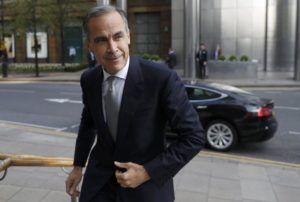Bank of England Governor Mark Carney called on Friday for Britain and the European Union to recognize each others' bank rules after Brexit or risk

Mark Carney, Governor of the Bank of England .
Bank of England Governor Mark Carney called on Friday for Britain and the European Union to recognize each others’ bank rules after Brexit or risk a potentially damaging hit to financial services across Europe.
Carney also said in a speech at Thomson Reuters’ London office that the BoE and banks had to be ready, simply for contingency reasons, for a “hard” Brexit.
He set a July 14 deadline for all cross-border financial firms operating in Britain to tell the BoE how they would cope with an abrupt EU exit.
Banks, including many from the United States and other countries around the world, use EU “passporting” rights to offer their services from London across the bloc, the region’s biggest financial center by far.
But that arrangement is set to end once Brexit pulls the UK from the single market in two years’ time, and it remains far from clear what kind of deal will replace it.
Prime Minister Theresa May mentioned the importance of reaching a trade deal with the EU that includes financial services as a “crucial sector” when she triggered the two-year process of Britain’s exit from the EU last week.
However, many bankers have said they are not convinced the government will prioritize their industry, with May making controls on immigration a top aim for Brexit.
Carney said he expected financial services to be part of a “bigger deal” on trade between the UK and EU
And in an apparent reference to signs that U.S. President Donald Trump may undo some of the reforms implemented since the financial crisis, Carney said on Friday that the global financial system was at a “fork in the road”.
Governments had to choose between maintaining high standards of regulation and respecting each others’ rules, or looking inward with big costs to global trade, he said.
Trump has said that internationally-inspired banking rules are holding back U.S. lending, and has ordered a review of regulation, raising concerns that the global approach to financial regulation will splinter.
“How Brexit negotiations conclude will be a litmus test for responsible financial globalisation,” Carney said.
“The EU and UK are therefore ideally positioned to create an effective system of deference to each other’s comparable regulatory outcomes, supported by commitments to common minimum standards and open supervisory co-operation,” he said.
This system could be bolstered by third-party peer reviews and a new independent dispute resolution mechanism, he said – adding that this could be a template for the wider world.
Such a system of mutual recognition of financial rules has not been tried before on the scale envisaged by Carney, which could make negotiations tricky and protracted.
The EU may also be reluctant to forgo the jurisdiction of the bloc’s top court in policing rule breaches.
BANKS CONCERNED
Banks are concerned that Britain and the EU will not reach a deal in time, and are preparing to move staff from London, and Germany and France are trying to lure jobs to their financial capitals.
HSBC, UBS and Morgan Stanley have decided to move about 1,000 staff each from London in the next two years, sources familiar with their plans have told Reuters.
Goldman Sachs (GS.N) said last month it would begin moving hundreds of people as part of its contingency plans.
Carney said the BoE needed to be prepared for a worst-case Brexit outcome, and alongside his speech, the BoE’s top banking regulator, Sam Woods, sent a letter to financial firms with cross-border activities ordering them to set out Brexit plans.
European banks which operated in London on the basis of passporting should be prepared to set up separately capitalized subsidiaries in Britain and submit to direct BoE regulation if Britain and the EU could not reach a deal, Woods added.
The BoE has said the UK financial sector accounts for almost a quarter of all EU financial services income and 40 percent of EU financial services exports. Eighty of the of the 358 banks operating in the UK are headquartered elsewhere in Europe.
Financial services account for 7 percent of British economic output, according to the BoE, although industry lobbyists say this rises to 12 percent if related professional services companies are included.
reuters.com

